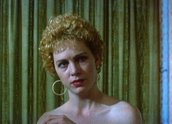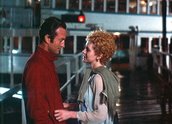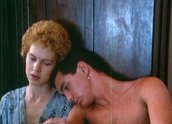


Winter of Our Dreams (1981)
Synopsis
After the body of a young heroin addict is found in Sydney Harbour, Rob (Bryan Brown) tries to find out why she committed suicide. He and the dead girl Lisa (Margie McCrae) were lovers at university, united by their political activism. He is now a journalist and bookseller, married to Gretel (Cathy Downes), an academic. At Lisa’s funeral, Rob notices a young woman. Lou (Judy Davis) is a Kings Cross prostitute and heroin addict. She is reluctant to talk about her friend, but Rob persists, telling her he wants to write an article about Lisa. Lou rejects the advances of her young supplier Pete (Baz Luhrmann) and is in turn rejected by Rob. She is shocked to find out he’s married, and that Rob doesn’t object to his wife’s open affair with another man.
Desperate and alone, Lou comes to stay with Rob and Gretel in their inner-city home in trendy Balmain. They nurse her through withdrawal from heroin. As she recovers, Lou reads Lisa’s diary, in which her unhappy affair with Rob is documented. Lou begins to identify herself ever more closely with the despair of her dead friend, especially her ultimate inability to connect with Rob. Lou leaves the house, and rents Lisa’s old room. Pete offers heroin but she remains straight. She invites Rob to Sunday lunch; he comes, but only to tell her he can’t stay – he has a soccer match, playing for the old Balmain Trotskyites. At an anti-nuclear protest site near the docks, Lou sits and cries, contemplating her future.
Curator’s notes
Winter of Our Dreams was one of the surprise hits of 1981. It played for five months in Sydney, a vindication of John Duigan’s decision to keep trying after it was initially rejected for funding, under a different title, in the late 1970s. Duigan rewrote the story entirely, but it was the interest of Bryan Brown and Judy Davis that finally helped to secure the fairly meagre budget (about A$320,000). Davis had made a huge impact two years earlier in My Brilliant Career (1979). Brown was already a seasoned and popular film actor, having made a dozen features in five years including Newsfront (1978) and Breaker Morant (1979). The surprise was that a film so austere and uncompromising, about a junkie prostitute’s failure to find love, would work so well with audiences.
The key is of course the performances of both actors, but especially Judy Davis, who won the AFI Award for best actress in 1981 for this role. Australian audiences were fascinated by this new talent, and this was a role completely unlike what they had seen in My Brilliant Career (1979). It was also unlike most other Australian films that had reached a mainstream audience. There had been similar art movies with slow, brooding stories, made on a shoestring, but few people outside the film festivals in Sydney and Melbourne went to see them. Winter of Our Dreams was an art house hit, and a sign that audiences would accept severe, gritty contemporary stories. The success of Monkey Grip (1982) one year later, with a similarly dark story, made it clear that Australian distributors needed to rethink their conservatism.
This was John Duigan’s fifth feature film. On four of them, he had been both writer and director. He made Dimboola (1979), a comedy by John Hibberd, in 1979, but it was an unusual departure. Duigan had always been a fairly introspective filmmaker, especially on The Trespassers (1976, see this site) and Mouth to Mouth (1978). In Winter of Our Dreams, he manages to tell a story that’s much bigger than its characters, without that ambition becoming too obvious or banal. The film dances lightly across social mobility, radical politics, gentrification and lost idealism, without losing sight of the humanity of its characters (or their lack of it).
The key word of the script is 'users’. Lou uses drugs to cope; Rob uses her to get a story he wants to tell; Gretel uses her young lover to hold onto a sense of adventure and daring in her life. Rob’s radical years at university have given way to harbour views and polite liberalism. When confronted with a person who so plainly needs help, he can neither turn away nor give Lou the love she desperately needs in order to go on living. Lou’s presence in Rob and Gretel’s house, as an addict in withdrawal, makes a mockery of their theoretical leftism. She is bewildered by their bohemian moral flexibility, and marooned by their inability to feel. Lou the junkie hooker has more humanity than either of them, although by the end, Rob has begun to realise his own coldness. Lou begins to emerge from her winter, but Duigan leaves us with the sense that Rob may just be entering his.
Winter of Our Dreams was released in Australian cinemas on 30 July 1981.
- Overview
- Curator’s notes
- Video 3 clips
- Principal credits
- Find a copy
- Make a comment
- Map
- Add your review



